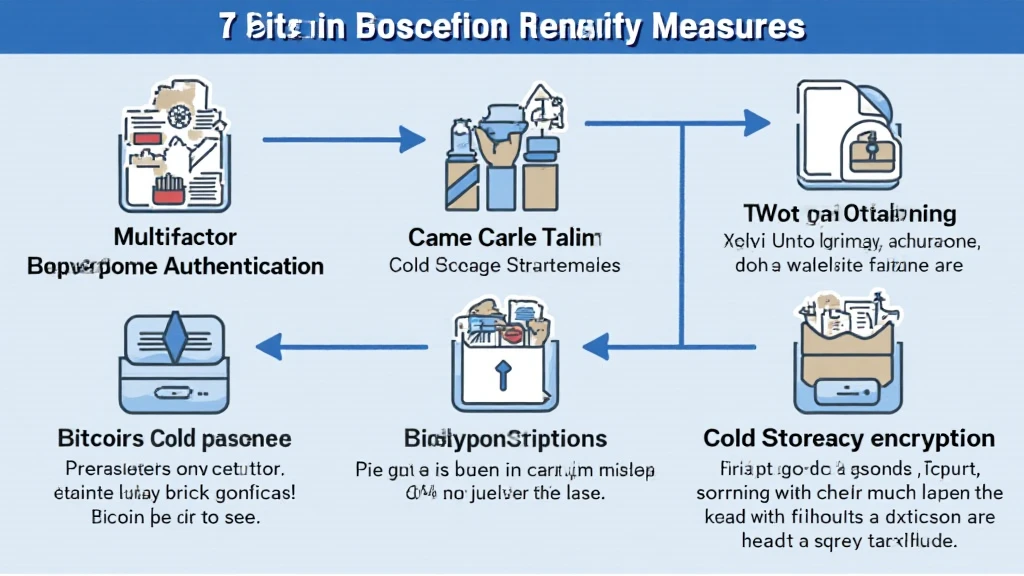
Bitcoin Exchange Security Measures: Safeguarding Your Digital Assets
With $4.1 billion lost to DeFi hacks in 2024, ensuring the security of your Bitcoin exchange is more critical than ever. As the demand for cryptocurrencies continues to grow, so do the risks associated with digital asset trading. This comprehensive guide aims to outline the necessary security measures that Bitcoin exchanges should implement to protect their users effectively.
Why Security is Paramount in Bitcoin Exchanges
Every day, thousands of new users flock to Bitcoin exchanges, drawn by the promise of wealth and investment opportunities. According to recent statistics, Vietnam’s crypto user growth rate has reached 120% in the past year alone, making it a hotbed for cryptocurrency activity. However, along with this surge comes an increased risk of hacking, fraud, and theft.
Like a bank vault for digital assets, the security of a Bitcoin exchange is paramount to safeguarding investments. Without robust security measures, users’ funds and sensitive data are at significant risk. Here’s what exchanges must consider to enhance their security posture.

Multi-Factor Authentication (MFA)
One of the most effective ways to secure accounts is by utilizing Multi-Factor Authentication (MFA). MFA requires users to verify their identity using more than one form of verification, typically a combination of something they know (a password) and something they have (a mobile device).
- Protects against unauthorized access: Even if a password is compromised, MFA acts as an additional barrier.
- Real-time notifications: Users receive alerts on unusual account activities, allowing them to react quickly.
Implementing MFA
Exchanges should encourage all users to enable MFA during the registration process, offering simple guides for setup. Services like Google Authenticator or Authy can enhance the security further, and providing UX-friendly interfaces can significantly improve user compliance.
Cold Storage Solutions
Much like safeguarding physical cash in a vault, Bitcoin exchanges should consider using cold storage solutions for the majority of their assets. Cold storage refers to keeping cryptocurrency assets offline, thus reducing the risk of hacks.
- Reduces online exposure: By storing the bulk of assets offline, the exposure to potential cyber threats decreases significantly.
- Regular audits: Periodic audits of cold storage can ensure that assets remain secure, as outlined in industry standards.
Best Practices for Cold Storage
Exchanges should work with experienced security specialists to create cold storage policies that include methods such as hardware wallets and air-gapped devices. Regularly reviewing and updating these practices can help mitigate risks associated with evolving cyber threats.
Encryption Techniques
Data encryption is the cornerstone of a secure Bitcoin exchange. Utilizing strong encryption techniques can protect user data from being intercepted during transactions.
- SSL Certificates: Implementing SSL certificates ensures that user information is encrypted during transmission.
- Database encryption: Storing sensitive data such as passwords and personal details in an encrypted format adds an additional layer of security.
Choosing the Right Encryption Protocol
When selecting encryption protocols, Bitcoin exchanges should prioritize modern standards such as AES-256, ensuring that their systems are resistant to potential decryptions. Regular updates and training for staff on encryption reinforcement can enhance overall security.
Regular Security Audits and Penetration Testing
Conducting regular security audits and penetration testing can identify vulnerabilities within a Bitcoin exchange. This not only helps in fixing potential weak points but also enhances compliance with regulatory frameworks.
- Identifies potential threats: Routine audits can uncover latent security risks that need to be addressed.
- Builds credibility: Regularly sharing audit results with users can enhance trust and credibility.
How to Conduct Security Audits
Engaging with third-party security firms that specialize in cryptocurrency can lead to comprehensive security audits. Estimating the risk factors and actively addressing them can significantly enhance user trust in the platform.
User Education and Awareness
Users play a crucial role in the security of their accounts. Educating them on best practices can lead to heightened security levels across the board.
- Phishing awareness: Teaching users how to identify phishing attempts can save them from compromising their accounts.
- Recommended tools: Suggesting reliable security tools, like hardware wallets and password managers, can empower users.
Creating Effective Educational Resources
Exchanges should maintain an informative blog and user guides, highlighting the importance of security in the crypto space. Regular webinars and online courses can also encourage user engagement with robust security practices.
Conclusion
As the Bitcoin and cryptocurrency markets continue to evolve rapidly, the security measures that protect exchanges and users must keep pace. Implementing comprehensive security strategies, such as Multi-Factor Authentication, cold storage solutions, and encryption techniques, can reduce risk significantly.
In the context of the growing Vietnamese market, exchanges must take proactive measures to cultivate a secure trading environment. By prioritizing user education and regular security audits, these platforms can foster trust and ensure a safer cryptocurrency landscape.
We hope this guide assists in your efforts to understand and implement critical Bitcoin exchange security measures. For more insights and updates, visit hibt.com.
Stay secure, and happy trading!
About the Expert: This article was written by Dr. Nguyễn Văn An, a leading figure in the field of blockchain security. He has authored over 30 papers and led several auditing projects with reputable firms.







